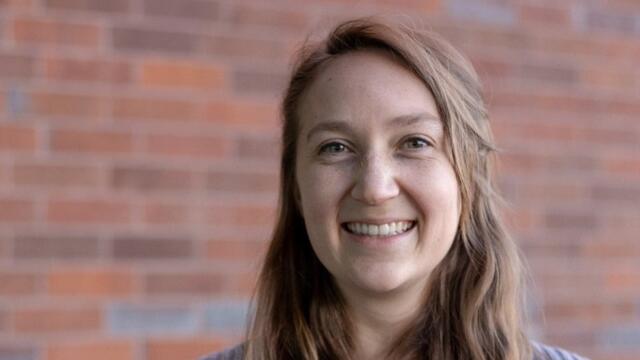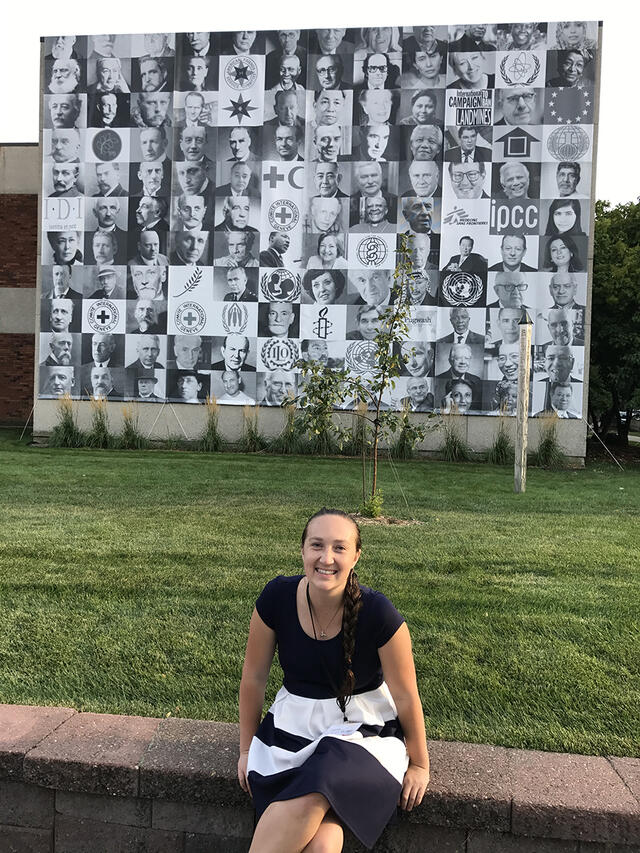Leanna Jasek-Rysdahl ’16
Leanna Jasek-Rysdahl ’16, completed funded grad program in Conflict Resolution at The Josef Korbel School of International Studies at the University of Denver, works as Teen Court/Youth Services Coordinator.

Expertise in Conflict Resolution fuels alumna’s career possibilities
On weekday mornings, Leanna Jasek-Rysdahl grabs her lunch and car keys and heads off in the shadow of the Rockies to her dream job as Teen Court/Youth Services coordinator for the city of Lone Tree in Colorado.
The 2016 graduate recently completed a funded graduate program in Conflict Resolution at the prestigious Josef Korbel School of International Studies at the University of Denver, but her interest in national security, human rights, and international affairs, with an emphasis on conflict resolution and restorative justice, took root at McDaniel.
“I had phenomenal opportunities and have a dream job because of the individuals I met and the experiences I had at McDaniel,” says Jasek-Rysdahl, who was an Honors student at McDaniel, graduating summa cum laude and Phi Beta Kappa with a double major in French and Political Science and International Studies. “McDaniel, the professors, and other students helped me in extraordinary ways.”

Leanna Jasek-Rysdahl '16 poses at a Nobel Prize forum
Since her graduation from McDaniel, Jasek-Rysdahl’s resume reflects the versatility of national security skills and experience that extend well beyond the CIA and NSA — she’s applied her expertise in AmeriCorps, research with Unite America, assisting a leading conflict resolution scholar with research, and currently as Teen Court/Youth Services coordinator.
Teen Court is a restorative justice program which teens can choose as an alternative to going to municipal court. Teen respondents and their parents are asked about impact, how to repair trust, and regain trust with the community, and the discussion results in a restorative agreement for the teen respondent.
“Three years ago, I did not know that my role as Teen Court coordinator even existed, and it is a phenomenal position,” she says. “Regardless of what happens, I want to continue to be involved in restorative justice for the rest of my life; that is important to me.”
It all began in a classroom on the Hill. She took adjunct faculty member Pam Zappardino’s Nonviolent Scriptbreaking over Jan Term of her sophomore year and followed that in the spring with professor Christianna Leahy’s Conflict Resolution.
By the time she began her junior year, she knew that she had found her passion and profession.
“I realized that conflict resolution epitomizes interdisciplinary studies, and I was fascinated by making connections when I would attend guest lectures or other classes,” says Jasek-Rysdahl, a Global Fellow who received the Robert Joseph Weber Award for Excellence in Political Science and International Studies as well as the Samuel Case ’63, M.Ed. ’66 and Susan Snodgrass Case ’65, M.Ed. ’84 Award for Excellence in Scholarly Research her senior year.
“McDaniel, the professors, and other students helped me in extraordinary ways.”
Research Methods with professor Francis Grice set her career compass when she realized that international affairs, research, and conflict resolution are subjects she could pursue after college. But first, Jasek-Rysdahl seized every opportunity for real-world experiences during her time at McDaniel — presenting papers and attending many peace and conflict resolution conferences and serving as a Global Zero representative campaigning for nuclear disarmament across the world.
“My professors played an enormous, fundamental role in developing my interests,” says Jasek-Rysdahl, crediting French professors Martine Motard-Noar and Sylvia Baage, Global Fellows advisor Amy McNichols, Pam Zappardino, and Political Science professors Grice, Leahy, and Anouar Boukhars with inspiring and encouraging her at every turn. “I remember receiving graded papers that were full of comments, going into office hours to discuss what research method to use, and having lunch or coffee and talking about a conference or just general questions I had about what to do after college.”
A National Science Foundation funded summer research fellowship on conflict resolution at the University of North Texas kindled her skills and interest in research while her internship with the Association for Diplomatic Studies and Training gave her a glimpse of professional possibilities.
Now, as she explores Ph.D. programs, those possibilities are as limitless as Jasek-Rysdahl's imagination and interests.
She envisions many roles she would enjoy —teaching at a small liberal arts college, doing analytical/policy research work for an organization that focuses on criminal justice reform, working at the Corporation for National and Community Service, researching restorative justice and Teen Court programs abroad, and more.
“These all appeal to me. One of my friends from grad school said that the ideal job should be one where you work for immediate and systemic changes at the same time — you should not have to sacrifice one for the other,” she says. “I thought this was impossible, but most of my conflict resolution colleagues (and me) now have positions where both are achieved and I think that is a good baseline going forward.”
About Leanna
Career: Teen Court/Youth Services Coordinator
Class: 2016
Majors: French and Political Science